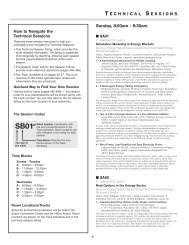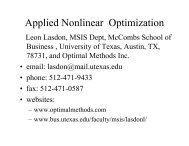Sunday
Sunday
Sunday
Create successful ePaper yourself
Turn your PDF publications into a flip-book with our unique Google optimized e-Paper software.
SB60<br />
3 - Telling the “Hot” from the “Not”: Online Content<br />
Recommendations on the Internet<br />
Yonatan Gur, Columbia Business School, New York, NY,<br />
United States of America, ygur14@gsb.columbia.edu,<br />
Omar Besbes, Assaf Zeevi<br />
A new class of online services allows publishers to direct readers to other webbased<br />
content they may be interested in. We study this dynamic recommendation<br />
problem, focusing on challenges introduced by the massive stream of new content<br />
and the short shelf-life of articles, and focusing on topic-based popularity as basis<br />
for recommendations. Work is based on collaboration with a leading provider of<br />
online content recommendations.<br />
■ SB60<br />
60- Remington- Hyatt<br />
Predictability and Resource Allocation Decisions in<br />
Air Traffic Management<br />
Sponsor: Aviation Applications<br />
Sponsored Session<br />
Chair: Shervin Ahmad Beygi, Lead Operations Research Analyst,<br />
Metron Aviation Inc., 45300 Catalina Ct, Dulles, VA, 20166,<br />
United States of America, shervin.ahmadbeygi@metronaviation.com<br />
1 - Performance-based Ground Delay Program Decision-making<br />
using Multiple Criteria : Single Airport Case<br />
Yi Liu, University of California, Berkeley, 107 McLaughlin Hall,<br />
Berkeley, CA, 94720, United States of America,<br />
liuyi.feier@gmail.com, Mark Hansen<br />
We develop performance metrics for capacity, efficiency and predictability, and<br />
show how these metrics may be traded off in the design of Ground Delay Program<br />
(GDP) under capacity uncertainty. We link the performance to the decisions on<br />
GDP clearance time and the scope of the program. This capability allows the<br />
service provider to make performance-based GDP decisions using multiple<br />
criteria.<br />
2 - Airline Voting Mechanisms for Parameter Selection for Air<br />
Traffic Flow Management (ATFM) Initiatives<br />
Vikrant Vaze, Member Research Staff, Philips Research North<br />
America, 345 Scarborough Road, Briarcliff Manor, NY, 10510,<br />
United States of America, vikrant.vaze@philips.com,<br />
Cynthia Barnhart<br />
Parameter selection for ATM initiatives is performed by the regulators while<br />
taking airline preferences into account. We design a voting scheme which can<br />
replace current ad-hoc methods. Strategic behavior is modeled using an integer<br />
programming formulation which explicitly accounts for tie-breaking rules. We<br />
solve for a Nash equilibrium using best response heuristics. We evaluate<br />
equilibrium properties including existence, uniqueness, convergence, system<br />
optimality and pareto optimality.<br />
3 - Flight Cancellation Behavior and Delay Savings Estimates<br />
Michael Seelhorst, University of California Berkeley, 1710<br />
Delaware St., Berkeley, CA, 94703, United States of America,<br />
mseelhorst@berkeley.edu, Mark Hansen<br />
A discrete choice model was used to infer airline flight cancellation preferences<br />
from a sample of on-time performance flight data. The predicted cancellation<br />
probabilities were then used as inputs to delay savings estimates, which were<br />
approximated with a continuous technique. The results from this work will be<br />
useful for incorporating flight cancellation decisions into system-wide delay<br />
forecasting models.<br />
■ SB61<br />
61- Russell- Hyatt<br />
Airport/Airline Operations Management<br />
Sponsor: Aviation Applications<br />
Sponsored Session<br />
Chair: Ahmed Ghoniem, Assistant Professor, University of<br />
Massachusetts Amherst, 121 Presidents Dr., Amherst, MA, 01003,<br />
United States of America, aghoniem@isenberg.umass.edu<br />
1 - Enhanced Column Generation for Multiple-runway Aircraft<br />
Sequencing Problem<br />
Farbod Farhadi, Doctoral Student, University of Massachusetts<br />
Amherst, Isenberg School of Management, 121 Presidents Drive,<br />
Amherst, MA, 01003, United States of America,<br />
ffarhadi@som.umass.edu, Ahmed Ghoniem<br />
We address mixed mode multiple-runway aircraft sequencing problem. An MIP<br />
formulation is enhanced with valid inequalities and symmetry-defeating<br />
INFORMS Phoenix – 2012<br />
100<br />
constraints. An alternative set partitioning problem is solved by column<br />
generation using multiple algorithmic features that accelerate the convergence<br />
and tighten the duality gap.<br />
2 - Aircraft Rescheduling under Operation Disruptions<br />
Mohamed Kharbeche, Postdoctoral Associate, Qatar University,<br />
Mechanical and Industrial Engineering, Doha, 2713, Qatar,<br />
mkharbec@qu.edu.qa, Ameer Al-Salem, Ahmed Ghoniem,<br />
Hanif D. Sherali<br />
We address optimization models for multiple-runway aircraft sequencing<br />
problems under operation disruptions, namely, aircraft delays, new aircraft<br />
arrivals and flight cancellations. Extensive computational results are reported for<br />
exact as well as heuristic methods.<br />
3 - An Integrated Approach for Airline Flight Scheduling, Fleet<br />
Assignment, and Aircraft Routing<br />
Ki-Hwan Bae, Virginia Polytechnic and State University, 250<br />
Durham Hall, Blacksburg, VA, 24061, United States of America,<br />
kbae04@vt.edu, Hanif D. Sherali, Mohamed Haouari<br />
We propose a model that integrates certain aspects of the schedule design, fleet<br />
assignment, and aircraft routing processes, while considering various modeling<br />
features. Maintenance routing decisions as well as through-flight opportunities<br />
are additionally incorporated in our model, and we apply a series of different<br />
solution techniques to handle the large-scale model formulation, reduce its<br />
complexity, and enhance its solvability.<br />
4 - Environmental Value of Optimal Separation in Continuous<br />
Descent Arrivals<br />
Heng Chen, Isenberg School of Management, 121 Presidents<br />
Drive, University of Massachusetts, Amherst, MA, 01003,<br />
United States of America, heng@som.umass.edu, Senay Solak<br />
Optimal separation in continuous descent arrivals (CDA) refers to the use of<br />
spacing policies that are shown to be optimal based on stochastic dynamic models.<br />
These models involve optimization of different objective structures defined as<br />
functions of runway utilization and airline operating costs. Considering some<br />
potentially implementable objective structures, we derive both analytical and<br />
numerical results that quantify the environmental value of using optimal<br />
separation policies in CDA.<br />
■ SB62<br />
62- Borein A - Hyatt<br />
Joint Session Auctions/MSOM:<br />
Auctions and Procurement<br />
Sponsor: Auctions & Manufacturing & Service Oper Mgmt<br />
Invited Session<br />
Chair: Gabriel Weintraub, Columbia Business School,<br />
3022 Broadway, New York, NY, 10027, United States of America,<br />
gyw2105@columbia.edu<br />
Co-Chair: Sang Won Kim, Columbia Business School,<br />
3022 Broadway, New York, NY, 10027, United States of America,<br />
skim14@gsb.columbia.edu<br />
1 - Production Cost Forecasts and Procurement Efficiency in<br />
Supply Chains<br />
Tunay Tunca, Associate Professor, University of Maryland,<br />
Robert H. Smith School of Business, College Park, MD, 20742,<br />
United States of America, ttunca@rhsmith.umd.edu<br />
We study the role supplier cost forecasting under upstream competition in supply<br />
chain procurement and examine the implications on market and channel<br />
performance. We derive a channel competitiveness measure that combines the<br />
forecast information structure in the supply chain with upstream channel<br />
fragmentation and study its relationship with supply chain efficiency. We show<br />
that such a measure can be a better indicator of supply chain performance<br />
compared to traditional measures.<br />
2 - Analysis of the Vickrey-Clarke-Groves (VCG) Mechanism in<br />
Combinatorial Auctions<br />
Sang Won Kim, Columbia Business School, 3022 Broadway,<br />
New York, NY, 10027, United States of America,<br />
skim14@gsb.columbia.edu, Jay Sethuraman, Gabriel Weintraub<br />
Recent theoretical works show that the VCG mechanism can have undesirable<br />
properties, such as low revenues, in combinatorial auction settings. In contrast,<br />
recent empirical work shows the opposite for a specific important application. In<br />
this work, we develop new theoretical results for VCG mechanism that explain<br />
this apparent paradox. More broadly, we show when VCG is expected to perform<br />
well in applications and when it does not.



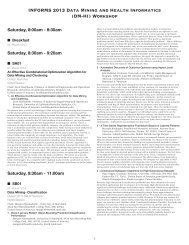
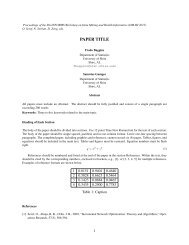
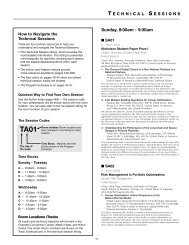
![[PDF] Charlotte Back Matter](https://img.yumpu.com/17933057/1/190x245/pdf-charlotte-back-matter.jpg?quality=85)
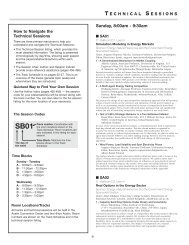
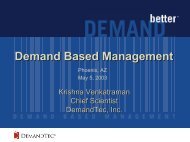
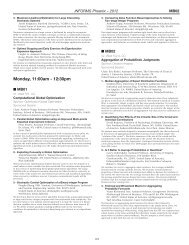
![[PDF] ALIO Back Matter](https://img.yumpu.com/17932960/1/190x245/pdf-alio-back-matter.jpg?quality=85)
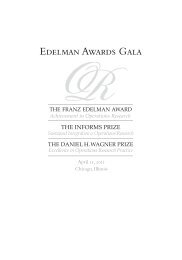
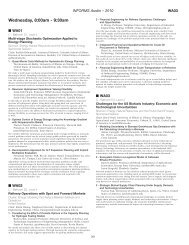
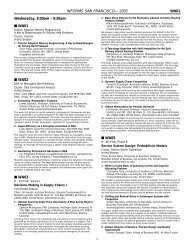
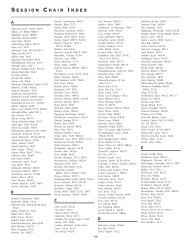
![[PDF] Monday, 8:00am - 9:30am](https://img.yumpu.com/17932954/1/190x245/pdf-monday-800am-930am.jpg?quality=85)
